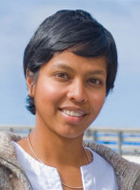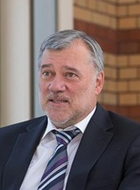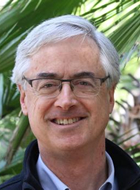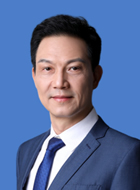| |
 |
| |
| |
 |
Lihini ALUWIHARE, Professor, University of California San Diego, USA, Marine Organic Geochemistry
|
Professor Aluwihare received her PhD from the MIT-Woods Hole Oceanographic Institution Joint Program in Oceanography in 1999, and she has since spent her career at the Scripps Institution of Oceanography at the University of California, San Diego. Research in the Aluwihare Group examines factors that control carbon and nitrogen cycling in aquatic environments, using both chemical composition analysis and natural abundance isotope tools. A particular focus of the group is to develop analytical approaches that address the complexity of dissolved organic matter isolated from various aquatic reservoirs, providing insights into how molecules may structure ecosystem interactions and identifying the composition of molecules that accumulate in these reservoirs on long time scales.
|
| |
|
 |
Gerhard J. HERNDL, Professor, Elected Member of the Austrian Academy of Sciences University of Vienna, Austria Marine Microbial and Molecular Ecology
|
Gerhard J. Herndl is Professor of Aquatic Biology at the Dept. of Functional and Evolutionary Ecology at the University of Vienna since 2008. Prior to that, he was Head of Department at the Royal Netherlands Institute for Sea Research (NIOZ) in the Netherlands and Professor of Biological Oceanography at the University of Groningen from 1999-2009. His research group investigates the carbon cycle in the ocean and the role of organisms in the nutrient cycling and the future of the ocean. Gerhard J. Herndl has published more than 300 papers in scientific journals. His research has been funded by the European Research Council with two Advanced Grants, he received the Wittgenstein Prize of the Science Fund (FWF), considered the Austrian Nobel Prize, G. E Hutchinson Award of ASLO and is member of the Austrian Academy of Sciences.
|
| |
|
 |
Jürgen KURTHS, Professor, Member of the Academia Europaea, Potsdam Institute for Climate Impact Research, Humboldt University Berlin, Germany, Complex System Science
|
Jürgen Kurths is a mathematician and a physicist. He received the Ph.D.degree from the GDR Academy of Sciences and his Dr. habil. from the university of Rostock.. He was a Full Professor with the University of Potsdam, from 1994 to 2008. He has been a Professor of Nonlinear Dynamics at the Humboldt University, Berlin, and the Chair of the Research Domain Complexity Science of the Potsdam Institute for Climate Impact Research, since 2008.
He is a Fellow of the American Physical Society, of the Royal Society of Edinburgh and of the Network Science Society and a member of the Academia Europaea. He received an Alexander von Humboldt Research Award in 2005 and 2021, the Richardson award from the European Geoscience Union in 2013, the Lagrange Award in 2022, the Chime Bell Price of the Hubei Province and the SigmaPhi Prize of the European Physical Society in 2023 (together with Nobel Price winner Michael Kosterlitz). He is Chapman Chair of the university of Fairbanks and Distinguished Adjunct Professor at KENTECH (Korea). He was the German Speaker of the International Research and Training Group (IRTG 1740): Dynamical and Transport Phenomena on Complex Networks (Germany and Brazil, DFG&FAPESP), is a highly-cited researcher (Clarivate) since 2017 without interruptions and got eight Honorary Doctorates and Honorary Professors. He is Editor-in-chief of CHAOS – A Journal of Nonlinear Science and editor of further journals.
The primary research interests of Jürgen Kurths include complex systems science, in particular synchronization, complex networks, extreme events and time series analysis and its applications in Earth Sciences, Physiology, engineering and others.
|
| |
|
 |
James LEAPE, Professor, Co-director of the Center for Ocean Solutions, Stanford University, USA,
Marine Conservation and Global Sustainability
|
Jim Leape is the William and Eva Price Senior Fellow and co-director of the Center for Ocean Solutions in the Stanford Woods Institute for the Environment, part of the Stanford Doerr School of Sustainability. At Stanford, Jim has led work on a wide range of ocean challenges, including research to develop insights and policy solutions to address illegal fishing, data and technology innovations for better management of ocean resources, and science and policy research to inform integration of blue foods into food system policymaking.
Before coming to Stanford in 2014, Jim was Director General of WWF International and leader of the global WWF Network, one of the world’s largest conservation organizations with, at that time, six million supporters and 6,000 staff working in nearly 100 countries; he had previously served as executive vice president of WWF-US. In those roles, he worked with government, private sector and civil society leaders to advance progress on a wide range of sustainability challenges, from commodity production to biodiversity protection to climate change.
Jim has also served as director of the conservation and science programs of the David and Lucile Packard Foundation, leading a range of philanthropic initiatives include efforts to advance energy policy in China, to support sustainable seafood, and to protect the Great Bear Rainforest of British Columbia. Earlier, Jim was a legal advisor to the United Nations Environment Programme in Nairobi, Kenya, Associate Professor at the University of Utah College of Law, and a litigator for National Audubon Society and for the US Department of Justice.
Jim is a Fellow with the Bezos Earth Fund and was earlier a Distinguished Fellow with the ClimateWorks Foundation. He has served on several boards, including the Marine Stewardship Council and Mission 2020, and in a wide variety of roles with the World Economic Forum. From 2007 to 2017, he was a member of the China Council for International Cooperation in Environment and Development, which advises the Premier of China. He has an A.B. from Harvard College and a J.D. from Harvard Law School.
|
| |
|
 |
Jian LIN, Chair Professor, Member of Academia Europaea, Southern University of Science and Technology, China, Ocean and Solid Earth Sciences
|
Chair Professor Jian Lin is an internationally renowned geophysicist, a member of Academia Europaea and European Academy of Sciences. He is the Director of Advanced Institute for Ocean Research, Southern University of Science and Technology, and leads the construction of Shenzhen Ocean University. He has made seminal contributions to global ocean sciences and earthquake research. Prof. Lin was a Chair of the InterRidge International Science Program, Senior Scientist at the Woods Hole Oceanographic Institution, and a faculty member of the Massachusetts Institute of Technology MIT/WHOI Joint Program in Oceanography. He was elected a fellow of American Geophysical Union (AGU), Geological Society of America (GSA), American Association for the Advancement of Science (AAAS), and Henry Bigelow Chair Award for Excellence in Oceanography. Prof. Lin is a recipient of the 2024 Axford Medal Award by the Asia Oceania Geosciences Society. His research was recognized as the Top Ten Advances in Ocean Science and Technology (2019), First Prize of Natural Science Award of Guangdong Province (2020), Grand Prize of Ocean Science and Technology Award (2021), and Top Ten Advances in China for Oceanology and Limnology (2023). He has published close to 300 papers in high-impact international journals including Nature and Science; one of his earthquake research papers was ranked by the Institute of Scientific Information as the most-cited paper in a decade.
|
| |
|
 |
Dalin Shi, Professor, Director of the State Key Laboratory of Marine Environmental Science, Xiamen University, China, Marine Ecophysiology and Biogeochemistry
|
Dalin Shi received a B.S. in Biology from Xiamen University and a Ph.D. in Geosciences from Princeton University. By integrating experiments on laboratory isolates with field studies on natural communities, Dalin Shi and his team investigate the interactions between phytoplankton ecophysiology and nutrient biogeochemistry, as well as how these interactions are influenced by changes in the ocean environment. His group’s research encompasses the roles of trace metals in marine biogeochemical cycles of carbon and nitrogen, nitrogen fixation in oligotrophic marine ecosystems, and the responses of phytoplankton to global change. Dalin Shi has authored nearly 60 papers in high-impact international journals, including Science, Science Advances, Nature Communications, and PNAS. He serves as an Associate Editor for Limnology and Oceanography and is a member of editorial boards of Global and Planetary Change and Fundamental Research. He has received several prestigious awards, such as the National Science Fund for Distinguished Young Scholars of China, the Youth Science and Technology Award from the Ecological Society of China, and the XPLORER Prize, among others.
|
| |
|
 |
John J. STEGEMAN, Senior Scientist, Woods Hole Oceanographic Institution, USA, Biochemical Toxicology
|
Dr. Stegeman is Sr. Scientist at the Woods Hole Oceanographic Institution. He received the Ph.D. in biochemistry in 1972 from Northwestern University in Illinois, USA. He has studied chemical metabolism and effects, primarily in aquatic models, for more than 35 years. This work has centered on the structure, function and regulation of cytochrome P450 genes and enzymes that metabolize drugs, chemicals, natural products and hormones. Research has included studies of carcinogenesis in fish in polluted environments, molecular biomarkers of chemical exposure in fish, birds, whales and humans, and the mechanisms by which chemicals act to cause disease, in adult and developmental stages of vertebrates. Recent research focused on neurodevelopmental effects of chemicals, chemical effects in the deep ocean, and the origin and evolution of the complex cytochrome P450 gene superfamily including in giant viruses, and plastics in the ocean. He has authored or co-authored over 350 publications and has organized numerous international conferences. In education he has trained over 30 Ph.D. and postdoctoral students and served many years on the Biology Committee for the Massachusetts Institute of Technology/Woods Hole Oceanographic Institution Joint Doctoral Program.
Dr. Stegeman has served on Editorial Boards of numerous journals, and as Editor and Associate Editor of several. He served as Chair of the Science Advisory Board of the National Toxicology Program (NTP, NIH), and served on committees for the National Research Council and the National Academy of Medicine in the US. He is a Lifetime Associate of the US National Academy of Sciences and is a Lifetime member and elected Fellow of the AAAS. In 2008 he was awarded a Ph.D. (honoris causa) from Gothenburg University in Sweden, for his influence on the growth of ecotoxicology worldwide, especially the impact on students, and in 2017, he was awarded a Doctor of Science (honoris causa) from St. Mary’s University of Minnesota. Dr. Stegeman held the Watson Chair for Excellence in Oceanography and served as Chair of the Biology Department at the Woods Hole Oceanographic Institution from 2000-2006. From 2004 to 2024 he was Director of the NSF/NIH Woods Hole Center for Oceans and Human Health, which considers harmful algal blooms and the health risk from low levels of algal toxins.
|
| |
|
| |
| |
|
| |
|
|
|
|
|
|
|